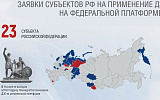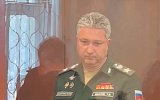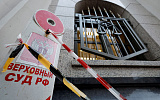The president-chronically sick, increasingly confused and reclusive, deeply unpopular and uncertain of his own survival-faces, for the first time since his re-election three years ago, a credible opposition movement, led by tough-minded pragmatists whom he cannot demonize, either to the western world or to his own voters, as communists and fascists.
The trouble is that something else is happening, also for the first time since 1996: Russian helicopters, aircraft and artillery are once again strafing the mountains of the northern Caucasus, where a band of Chechen warlords and Islamist fighters are defying Moscow's authority.
So what is the connection between these two developments? Perhaps none exists as yet, although Moscow would not be Moscow if it were not buzzing with elaborate theories about provocation and counter-provocation.
So, Theory A says the connection is certainly there.
Many Russians genuinely fear that people in Mr. Yeltsin"s entourage, desperate to hold on to power, are hoping that some kind of emergency will pop up to prompt the president to put off the polls.
The really worrying prospect, they claim, is that Mr. Yeltsin"s camp is toying with other ideas, ranging from the outlandish to the wholly unconstitutional: declaring a union with Belarus, for example, or banning the Communist Party, and announcing a state of emergency.
Krasnoyarsk Governor and a presidential hopeful Alexander Lebed suggested that the bombing of Chechnya and bomb attacks on apartment buildings in Moscow could be part of a covert government bid to destabilize Russia and cancel forthcoming elections.
Lebed, the man who signed a disastrous peace deal to end the war in Chechnya three years ago, told French daily Le Figaro that the current bombing of the breakaway republic was either stupid or a sinister bid to destabilize Russia.
"I am tempted to pick the latter. ... It looks like a wide-ranging attempt at destabilization," he said.
Mr. Lebed said he was "almost convinced" that the government was behind bomb attacks that have killed more than 300 people in Moscow and other Russian cities.
"The president and 'the family' are isolated. They lack any political strength to win the elections. Faced with a desperate situation, the government can have only one aim: destabilize, so that there will be no elections," he said.
True, on the next day Mr. Lebed went into damage-control mode, saying his words were taken out of context, and "expressed regret that he forgot how to explain simple things to journalists." According to a statement released by his press service, Lebed was unhappy with how his words were translated and claimed that "the correspondent omitted part of the interview, thus twisting ideas and shifting accents."
But, first, the damage had already been done. Second, Yeltsin"s detractors say, regardless of who is to blame for triggering the latest Caucasian crisis, there can be little doubt of the acute risks that are created by the Kremlin's double bind.
Because Mr. Yeltsin is in a tight corner politically, he has every incentive to play dirty tricks on his opponents; and war in the Caucasus, on past evidence, could give him-and his new prime minister, the veteran KGB officer Vladimir Putin-every opportunity to do so.
To put things at their simplest, they point out, a crisis in the Caucasus could provide the Kremlin with a perfect opportunity to postpone December's parliamentary elections-especially if the violence were to spread (in the form of bombings, kidnappings or hijackings) to Russia's heartland.
Even if things do not go that far, the experience of the Chechen war, which raged for nearly two ghastly years until August 1996, suggests that conflict on Russia's southern border can have a poisonous effect on political life in the metropolis. The bloodshed in Chechnya divided and demoralized Moscow's liberal reformers, and gave heart to some of the darkest elements in the odd coalition of forces that have kept Mr. Yeltsin in office.
Remember what happened in early 1996, when the war in Chechnya was sputtering away and Mr. Yeltsin faced the risk of defeat at the ballot box. His advisers were united in their determination to keep him in office, but could not agree on the best way.
One camp thought that the president could still win an electoral contest; another wanted him to extend his rule by engineering a political or military crisis, declaring a state of emergency and canceling the poll.
The latter camp coincided precisely with the "war party" which also saw advantage (political and, almost certainly, financial too) in the waging of a cruel and open-ended conflict in Chechnya. In the end, the more moderate members of Mr. Yeltsin's entourage won, but only by the skin of their teeth.
Is there logic to these theories? There certainly is. Yet, the sticking point, of course, is whether the president himself or any of the sinister people in his coterie are capable of setting this Byzantine intrigue in motion? Some people say they are, others disagree.
Asked about Lebed's accusations, Vladimir Putin, Russia"s prime minister and himself a candidate for presidency, said, "I cannot believe he said this."
Mr. Yeltsin"s people have already hit back. Kremlin officials claim that the Mabetex and the Bank of New York scandals are orchestrated by the mayor of Moscow, Yuri Luzhkov, a leading contender to win Mr. Yeltsin"s job.
"I even know who ordered these materials and how much was paid for the publications," Pavel Borodin, the Kremlin property manager involved in the allegations, told a French newspaper last month.
Boris Berezovsky, a tycoon close to the presidential court, has been more specific. "Luzhkov and his henchmen are behind these reports and should be brought to justice," he told the Interfax news agency.
Some of the last month"s reports included transcripts of telephone conversations between a man whose "voice resembled that of Berezovsky" and a man who "sounded like Movladi Udugov," the foreign minister of Aslan Maskhadov"s self-styled government. They were published in the Moskovsky Komsomolets, a Moscow daily close to Mr. Luzhkov, and discussed ad nausea in the news programs of the NTV television station, which is owned by Vladimir Gusinsky, Mr. Berezovsky"s fellow tycoon and arch-enemy.
The conversations, if proved authentic, would have had Boris Berezovsky indirectly linked to the fighting in southern Russia and the recent wave of terrorist bombings.
The problem for the Kremlin"s enemies is that for every theory there is a counter-theory-and for every provocation, a counter-provocation.
Which brings us directly to Theory B. Presidential candidate X, unprepared to lose at the ballot box in the next year"s poll, is eager to prevent the Kremlin"s appointee from winning-by fair means certainly, possibly by foul ones too.
He watches with dismay the Kremlin"s candidate, the efficient Mr. Putin (a former Soviet spy), grow in stature and plausibility (since hostilities began in Dagestan, the prime minister"s ratings in public opinion polls for presidency went from two to 13 percent, second only to Yevgeny Primakov, former premier and head of the Fatherland-All Russia electoral bloc, and the Communist leader Gennady Zyuganov).
Fortunately for candidate X, a war in the Caucasus breaks out and bombs go off in Moscow buildings. Coincidentally, corruption investigations into the Kremlin"s crony-ridden and murky finances get under way in Switzerland and in New York.
And scandal involving foreigners counts most: in Russian eyes, the evidence of law enforcers from abroad is more credible and more damaging than the home-brewed stuff.
Is there a connection between the two developments? There could be. What it ultimately boils down to is the same question: Does our candidate X. have the nerve and the ruthlessness to carry out the plot? There are some Russians who believe he does.
The two theories are now competing in the public mind-and in the mind of political elites. The first theory may be more popular among the general public, the second among the elites-at least in some circles.
Most likely, both are preposterous and gross inventions. That, however, is not the morale of the story. What is more important is that both the Kremlin and its opponents should have their say and have the recourse, if need must be, to their regular vehicles of abuse-if only so that their true intentions-and their imbecility of mind-is made known to the Russian public.
In this situation, the dirt flying out of investigations in Moscow, New York, Switzerland and elsewhere can do substantially less harm than any attempt at censorship.
As for Mr. Yeltsin himself, he is so unloved these days that allegations of wrongdoing look unlikely, at first blush, to make much difference-unless, that is, they become so grossly damning that they force him to sack a key courtier or even to resign himself. So far, however, the main result is to make the run-up to Russia"s general election, due on December 19th, even more tortuous and mucky.
















